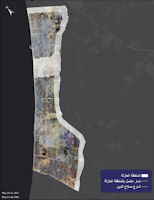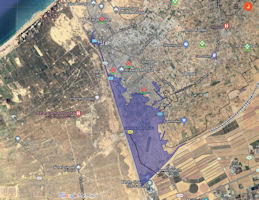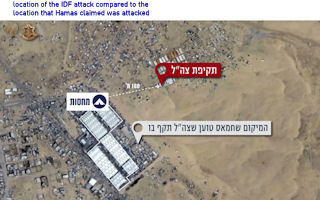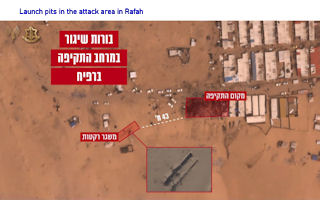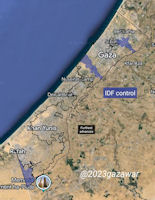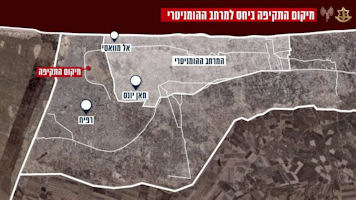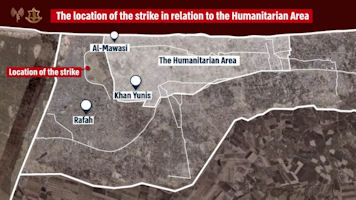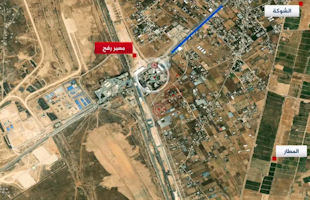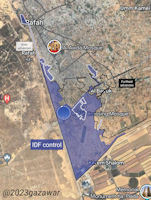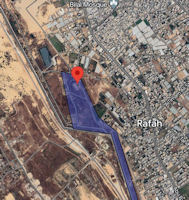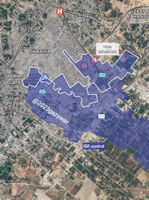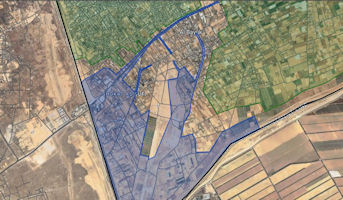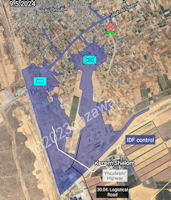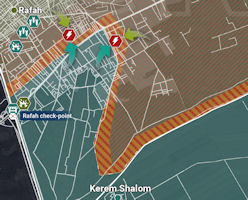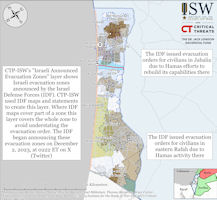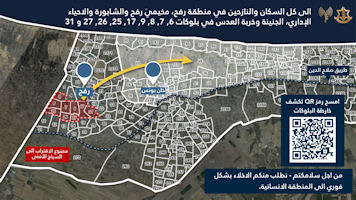Operation Iron Swords - Day 241 - 03 June 2024
“At any point, Hamas could have ended this burgeoning tragedy to
surrender and release every hostage. …
Hamas instigated and owns this humanitarian catastrophe.”
Sen. John Fetterman (D-PA)
Contents |
|
NEW - War Termination NEW - Operations NEW - Operations - Gaza NEW - Operations - Judea-Samaria NEW - Operations - Lebanon NEW - Operations - Syria / Iraq NEW - Operations - Yemen UPDATED - Operations Maps NEW - By-Standers NEW - Axis of Resistance NEW - Allied for Democracy UPDATED - By the Numbers |
"Netanyahu's intention now to belittle the president, who did the unbelievable for Israel in the current war, two months before the election date in the United States, is an attempt to thwart Biden in order to pave the way for Trump to win the election. Trump in return will let Netanyahu continue to perpetuate the war and especially his chair, along with the huge prices we will have to pay. First and foremost, slamming the door to the end of the war in Gaza, leaving the war of attrition in the north, erasing the chance to return the abductees and a funeral ceremony for the regional deal with Saudi Arabia." Maj. Gen. [res] Yisrael Ziv wrote.
War Termination
The negotiations between "Israel" and Hamas have hit a roadblock as Hamas officials express dissatisfaction with the one-sided terms from "Israel," Wall Street Journal reports. According to statements made to mediators, Hamas has not seen an Israeli proposal that aligns with the vision outlined by US President Biden. While acknowledging the seriousness of Biden's ideas, Hamas is seeking a detailed written proposal that aligns with his description and ensures a comprehensive and enduring ceasefire, as conveyed by Arab mediators.
Senior Hamas official Ghazi Hamad criticized "Israel" for not being serious about negotiating a ceasefire. Meanwhile, Hamas's chief in Gaza, Yahya Sinwar, appears to be in no rush to end the war, believing it is strategically advantageous for the goal of liberation. However, Hamas's political bureau leaders are reportedly eager to reach a resolution, provided it guarantees the group's recognition and continued governance of Gaza. Hamas has gained confidence in its ability to withstand "Israel's" campaign, particularly with growing international condemnation over Israeli genocidal actions in Rafah. But indirect negotiations have stalled primarily due to disagreements over whether an initial temporary ceasefire would lead to a permanent end to the war.
The most recent Israeli proposal received by Hamas described a period of "sustainable calm" in ambiguous terms, which has further complicated negotiations. Hamas remains wary of trusting "Israel" without written guarantees, though achieving this seems challenging given the current political climate in "Israel," an observer told WSJ.
"As laid out in President Biden’s speech, the initial terms of the proposed deal include a disturbing imbalance in who guarantees that Hamas and Israel fulfill their commitments under the agreement—a problem that should be fixed now rather than later." according to Robert Satloff is the Segal Executive Director of The Washington Institute. "Egypt and Qatar have shown themselves to be woefully incapable of influencing Hamas over the past eight months, so the idea that there is any value in their “assurances” regarding the group’s future behavior is risible. By contrast, any U.S. administration necessarily has considerable leverage on Israel’s actions given... Washington and Jerusalem will almost inevitably disagree in their judgment of what constitutes an actionable Hamas violation. Indeed, the group will likely ready itself to engineer such a clash at a moment of heightened instability on another Israeli front..."
In a TV report by Channel 12 on Monday evening, the ambiguously worded Clause 14 in Israel's latest hostage deal proposal has been identified as the central point of contention between Prime Minister Benjamin Netanyahu and U.S. President Joe Biden. This follows Netanyahu's statement to the Knesset's Foreign Affairs and Defense Committee, asserting that "the proposal that [U.S. President Joe] Biden presented is incomplete," and highlighting "gaps" between the Israeli version and Biden’s interpretation.
Clause 14, concerning the transition from Phase 1's ceasefire to Phase 2's permanent cessation, reads: "All the processes on which there is agreement in Phase 1 of the deal, including the cessation of military activities by both sides and the other summaries, will continue in Phase 2, as long as the negotiations on implementing Phase 2 continue." Clause 14, concerning the transition from Phase 1's ceasefire to Phase 2's permanent cessation, reads: "All the processes on which there is agreement in Phase 1 of the deal, including the cessation of military activities by both sides and the other summaries, will continue in Phase 2, as long as the negotiations on implementing Phase 2 continue."
Biden emphasized in his address, “If Hamas fails to fulfill its commitments under the deal, Israel can resume military operations.” Netanyahu, speaking in a closed-door Knesset committee session, reiterated Israel's intention to resume military operations at the end of Phase 1, which Channel 12’s source suggests could provoke Hamas's Gaza chief Yahya Sinwar to derail the deal.
US Secretary of State Anthony Blinken stressed the positive aspects of the ceasefire proposal for Israel, while there were conflicting statements about Tel Aviv’s position on the proposal. The US State Department said early Monday that Blinken held two separate calls with Israeli Defense Minister Yoav Gallant and War Council Minister Benny Gantz regarding the ceasefire agreement proposal that President Joe Biden revealed last Friday. The ministry added in a statement that the Foreign Minister told Gallant that the agreement includes greater integration of Israel in the region and enhances its security interests in the long term.
In a separate call, Blinken reviewed with Gantz the security benefits for Israel if it agreed to the proposal, which is essentially Israeli. The US State Department stated that Blinken stressed to the Israeli War Council member that Hamas must accept the proposal without delay.
A statement issued by the Israeli Ministry of Defense said that Gallant assured the US Secretary of State that the war “will not stop until the kidnappers are returned and an alternative rule is found for Hamas in Gaza,” according to what Al-Hurra’s correspondent in Israel reported. The statement stated that Gallant referred to “moves being made to overthrow Hamas and establish an alternative rule for it.” For its part, the US State Department stated that Blinken discussed with Gallant and Gantz the proposal aimed at achieving a complete and comprehensive ceasefire in Gaza as part of a deal on the release of the hostages, which guarantees the release of all of them and increases the amount of humanitarian aid that reaches various parts of Gaza. Blinken praised Israel's readiness to conclude a deal, considering that Hamas "now bears responsibility for approving the proposal."
Yesterday, the Coordinator for Strategic Affairs at the US National Security Council, John Kirby, expressed Washington's hope that Hamas would agree to the proposal and begin implementing its first phase. Kirby added in an interview with the American ABC network that while the first phase of the agreement, which extends for 6 weeks, is being implemented without fighting, Hamas and Israel will negotiate the implementation of the second phase. The American official also said that if Hamas agrees to the proposal announced by President Joe Biden, all expectations of the US administration indicate that Israel will agree to it in turn.
The Hamas movement announced that it was dealing positively with the ideas presented by the US President and considered them a general framework, and stressed the necessity of achieving this by reaching a complete agreement that includes a ceasefire, Israeli withdrawal, and relief and reconstruction of the Gaza Strip.
Meanwhile, last night, the Israeli War Council held a meeting to discuss the possible exchange deal, amid conflicting news about Tel Aviv’s position on the proposal on the table to conclude an agreement after the US President announced its details. At a time when the Israeli Broadcasting Corporation said that the Israeli negotiating team withheld the details of the proposal from the Ministerial Council for fear of its contents being leaked, the American CBS network quoted an Israeli official as saying that Prime Minister Benjamin Netanyahu and the War Council had agreed to the proposal but were waiting for Hamas’ response. However, the Broadcasting Corporation reported, in return, that Netanyahu promised his coalition partners that there would be no end to the war, and it also said that the Prime Minister’s statements confirm that he will not agree to a permanent ceasefire without fulfilling the conditions.
It revealed that Netanyahu informed his coalition partners that the chances of reaching an agreement with Hamas are low, and that US President Joe Biden did not present the real conditions that Israel agreed to within the framework of the negotiations.
For its part, Israeli Channel 13 quoted high-ranking officials in the Likud Party led by Netanyahu, that the latter would not be able to pass the agreement proposal announced by Biden, because this step would lead to the collapse of the government, and that if Hamas responded positively to the proposal, Netanyahu will find a way to evade or delay through conflicting statements or repeating what he has already agreed to. In this context, Israeli Channel 7 quoted National Security Minister Itamar Ben Gvir threatening again that if Netanyahu continued on the path of concluding the deal, he would dissolve the government. Other members of the government, including Finance Minister Bezalel Smotrich, made a similar threat.
Regarding the discussions within the War Council, which approved the Israeli proposal, Israeli Channel 12 quoted its officials as saying that the Council is studying the proposal that Israel not wait for Hamas’ response, and take proactive steps to ensure a deal is reached. The channel said that officials of the War Council will propose starting talks and taking steps in terms of humanitarian aid. According to the same source, officials in the war council expressed their fear that efforts to reach a deal would be harmed while waiting for Hamas’ response.
Regarding the Israeli movement demanding the release of prisoners, the Israeli Broadcasting Corporation reported that protesters gathered last night in front of the office of Israeli Prime Minister Benjamin Netanyahu in occupied Jerusalem, to demand the conclusion of the exchange deal revealed by the American President. Demonstrators also gathered in Tel Aviv, raising banners reading “Deal Now” and other banners bearing pictures of Israeli prisoners in Gaza. For its part, Israeli Army Radio said that residents of the Nir Oz settlement, from which 77 people were detained on October 7, called on Prime Minister Benjamin Netanyahu to approve the swap deal proposal.
The Associated Press also quoted family members of Israeli prisoners as saying that time is running out and that the proposed deal may be the last chance, and they called on the Israeli leadership not to disappoint them. The families of the prisoners accused the Israeli government of doing too much to delay reaching an agreement, which cost the lives of many hostages. The Israeli government estimates the number of detainees in Gaza at about 125, and it has announced the recovery of the bodies of a number of prisoners who were killed during the past eight months.
Israeli media quoted Israeli Prime Minister Benjamin Netanyahu as saying that what US President Joe Biden presented regarding the deal proposal was not accurate, refusing to agree to stop the war on the Gaza Strip before achieving its goals. Netanyahu said - according to what was reported by the Israeli Broadcasting Corporation - that he “will not review the details of the deal, but what Biden presented is not accurate and there are details that have not been revealed.”
He added, "We can stop the fighting for 42 days to return the hostages, but we will not give up absolute victory." Likewise, he was quoted by the Israel Today newspaper, where he said, “Israel can stop the fighting to return the kidnapped people, but it cannot stop the war.” Channel 12 also quoted him as saying, “Biden presented only part of the broad outlines of the deal, and we will not stop the war without achieving its goals,” adding that the number of abductees who will be released in the first phase of the deal has not yet been determined.
In this context, the Israeli Broadcasting Authority reported, citing informed sources, that the War Council discussed the possibility of sending the negotiating delegation to Cairo, to continue contacts with the mediators. The Israeli Broadcasting Corporation added that the War Council decided to wait until a positive response was received from the mediators before sending the delegation.
White House National Security Communications Advisor John Kirby said on Monday that the Islamic Resistance Movement ( Hamas ) said it received President Joe Biden’s speech “positively” and should agree to a ceasefire agreement with Israel, while 5 Arab countries supported the efforts. Mediation to end the Israeli aggression on the Gaza Strip . Kirby added that the current Israeli proposal is the result of intense diplomatic efforts between the United States and Israel, and that the ball is now in Hamas' court, refusing to reveal the nature of the minor gaps between the two parties.
In response to a question about Israeli Prime Minister Benjamin Netanyahu's statements , Kirby said that he was not aware of any gaps between the United States and Israel, reiterating Washington's support for what he called "Israel's right and responsibility to pursue Hamas leaders." Kirby confirmed that the second phase will include the release of the rest of the prisoners and detainees, after which the temporary ceasefire will turn into a permanent cessation of hostilities, noting that the next day in Gaza is not part of the proposal presented to Hamas, but work is underway on that.
In turn, the US State Department said that the ceasefire agreement was presented to Hamas last Thursday, “and we have not yet received a response,” indicating that it is “completely” confident that Israel will agree to it, and that the proposal was Israeli, and was developed in consultation with the United States, Qatar, and Egypt. US Secretary of State Anthony Blinken stressed the "positives" of the ceasefire proposal for Israel, with Washington expressing its hope that Hamas would agree to the proposal and begin implementing its first phase.
Former Israeli military intelligence officer Michael Milstein ruled out that Israel would succeed in finding a local alternative to replace Hamas as the ruling authority in the Gaza Strip , pointing to previous failed attempts. The Associated Press quoted Milstein, an analyst specializing in Palestinian affairs at Tel Aviv University, as saying that there are no local actors bold enough to present themselves as an alternative to Hamas to run the Strip.
Commenting on statements in this regard by Israeli Defense Minister Yoav Galant, he added that the wishes expressed by the latter would be tantamount to a “suicide mission” for any local leader in Gaza. He continued that although Hamas suffered severe damage during the past eight months, its influence on the people of the Gaza Strip remains strong. The former Israeli intelligence officer pointed out the failure of attempts made by Israel in the 1970s and 1980s to impose a governance model like the one it seeks now by empowering tribal entities or local leaders, and these attempts ended tragically, as he put it. Milstein said that those who accept cooperation will be considered agents by the Palestinians, adding that unless Israel maintains a permanent presence in Gaza, these “alternative forces” that it is trying to form to replace Hamas will be extremely fragile.
Israeli Defense Minister Yoav Galant said yesterday, Sunday, that the Israeli government will not accept Hamas rule at the end of the war, and that it is working to find an alternative to the movement. Galant added that in parallel with the military action, it is important for the security establishment to prepare a governmental alternative to Hamas, saying that work is being done on the ground and in other ways to dismantle Hamas’ military and governmental capabilities, and that this achieves Israel’s goals and returns the detainees in Gaza.
Last March, sources told Al Jazeera that the notables of the Gaza families rejected an offer from Israel to cooperate with it, and at that time Abu Salman Al-Mughni - one of the notables - stated that the tribes could not accept being an alternative to the government and to whomever the people chose.
Hossam Badran , a member of the Political Bureau of the Islamic Resistance Movement ( Hamas ), said that the movement has not received any new paper for a ceasefire in the Gaza Strip, and the proposal presented by the mediators on May 6, and agreed upon by Hamas and the resistance factions, is the approved position. Badran added, "US President Joe Biden's speech regarding negotiations to end the war on Gaza indicates that the occupation and its main supporters are in a state of confusion, because they bet on the defeat of our people and the defeat of their resistance, and this did not happen."
He pointed out that Biden's statement acknowledged, in one way or another, that the occupation is unable to achieve any of its political and military goals, which it announced over the past months, pointing out that the United States has the tools and ability to put pressure on Israeli Prime Minister Benjamin Netanyahu and his government to stop the war, because they are the ones who are abstaining of reaching any agreement. Badran stressed that Netanyahu is the only party that has obstructed reaching any agreement, and wants the war to continue for personal and partisan reasons, and is ignoring the regional and international position, which is almost unanimous in stopping it.
He said that Netanyahu's statements contained something of an answer to Biden's speech that he did not want to move towards any practical agreement, stressing that "the basic guarantee for implementing any agreement is our strength in the field as a people and resistance." He stressed that the resistance will not allow the occupation to have any role in arranging our internal affairs, whether the situation inside Gaza or dealing with the crossings in general, especially the Rafah crossing, indicating that the occupation must withdraw from the Rafah crossing and this is a matter of Palestinian consensus, and the previous administration of the crossing must return. As for arranging the Palestinian situation, this is an internal matter that we Palestinians manage without agreeing to any regional or international pressure.
Qatar, Egypt and the United States - in their capacity as mediators in the ongoing discussions to ensure a ceasefire in the Gaza Strip and the release of hostages and detainees - called on both Hamas and Israel to conclude an agreement that embodies the principles outlined by Biden in the speech of May 31, 2024, according to a joint statement on Saturday. Those principles that Biden spoke about include the withdrawal of Israeli forces from all populated areas in the Gaza Strip, and the release of detainees, including women, the elderly, and the wounded, in exchange for the release of hundreds of Palestinian prisoners, and the entry of aid into the Strip, according to what a Qatari Foreign Ministry statement said on Saturday.
Egyptian Foreign Minister Sameh Shoukry said that the currently proposed proposal for a ceasefire in Gaza and the introduction of aid into the Strip deserves acceptance, adding that his country is awaiting the Israeli response to this proposal after the Hamas movement announced that it received the proposal positively. Shoukry continued, during a press conference with his Spanish counterpart in Madrid, that Egypt is motivating “the two conflicting parties” to accept the proposed plan, and that Egypt continues to communicate and coordinate with its partners to end the “war” that caused the “killing” of 37,000 Palestinians, the majority of whom are women and children .
Shukry added that Egypt is looking forward to resolving the Palestinian issue on the basis of the two-state solution and establishing the Palestinian state on the 1967 borders with “East Jerusalem” as its capital, noting that what is happening in Gaza is troubling Egypt due to the humanitarian damage, pointing out that “Israel’s” practices violate the rules of international law, and that The war in Gaza exposes the region to chaos .
In response to a question about the Israeli presence near the Egyptian border, he explained that the Israeli invasion of the Gaza Strip is rejected by most international powers, and that the connection of this presence to the Rafah crossing is rejected by Egyptian policy, stressing that the crossing represents a major means of communication between Egypt and Gaza to bring in aid and rescue the wounded.
Regarding the “peace” treaty between Egypt and Israel, Shukry said that the treaty has been stable for four decades and has mechanisms that enable it to confront deviations from its rules, and that the treaty must be respected and its provisions must be respected and preserved . The Egyptian Foreign Minister stressed in his speech that the “war” on the Gaza Strip caused catastrophic repercussions on the Palestinian people, and that the rules of international law must be complied with, the decisions of the International Court of Justice must be respected, and the system of multilateral international action must be preserved .
Operational Update
The IDF representatives informed the families of Haim Peri, Yoram Metzger, Amiram Koper and Nadav Popelwell, who were brutally abducted to the Gaza Strip, that they are no longer alive and their bodies are being held by the terrorist organization Hamas. The decision to determine their death was based on intelligence information and was approved by an expert committee of the Ministry of Health in collaboration with the Ministry of Religion and the Chief Rabbi of Israel. The circumstances of their deaths in Hamas captivity are still under investigation by all the professionals. The IDF operates in a wide variety of methods in order to gather information about the abductions and the abductees remaining in the Gaza Strip. The IDF and other security agencies will continue to accompany the families of the abductees as long as necessary until they return home.
The body of the late Dolev Yehud was located in Kibbutz Nir Oz, this after a strenuous investigation by the ITAN unit in collaboration with anthropologists and after scientific identification. The late Dolev Yehud, son of Kibbutz Nir Oz, served as a medic in the Rescue Union and MDA. During the terrorist attack he left his home to help and save lives. The late Dolev was murdered by Hamas on October 7, 22 in Tishrei, and his body was found in Kibbutz Nir Oz. After an identification procedure carried out by medical officials at the National Institute of Forensic Medicine and the Tzvi Beshura Institute, IDF representatives sent a message to the family. The IDF shares in the family's grief at this difficult time.
Tomorrow (Tuesday), in the morning, a military exercise will take place in the Carmel Beach area. As part of the exercise, echoes of explosions will be heard in this area. There is no fear of a security incident.
An initiative to end the war presented by US President Joe Biden sparked a major debate between its supporters and those who rejected it. The initiative, which includes a cessation of Israeli aggression and a withdrawal from the Gaza Strip, received a positive attitude from the resistance. On the other hand, the occupation government rejected the initiative, stressing that the war would continue until “the elimination of Hamas,” as Benjamin Netanyahu says. Activists considered that the initiative was a lifeline for the occupation government after months of failure and impotence in the Gaza Strip.
Many comments from Arab activists about the US President’s initiative to end the war in Gaza . Here we have a comment from “Ahmed” who wrote: Since the train to liberate Al-Aqsa has set off and has covered most of the distance and is about to reach the station, it was necessary to complete the remaining meters, especially since its fuel is the blood of our brothers and families. Oh God, grant victory to our mujahideen brothers in the land of Palestine and have mercy on our righteous martyrs. “Yousriya Hamed” had a comment in it. I say it quite frankly: what was taken by force can only be recovered by force. The Zionists are a people who do not respond except under the logic of force over them.
As for the “Dean” account, he wrote a comment on this topic. The Zionists' truce is always a truce for the sake of treachery, their covenants are contracts for the sake of breaking, their construction is for the sake of demolition, and their faith is for the sake of lying.
In addition to being one of the founders of the famous Pink Floyd band, Roger Waters is known as a supporter of the Palestinian cause. Waters appeared in a recent video criticizing the occupation's crimes against civilians, especially in the city of Rafah. The British musician addressed the occupation settlers by saying that they should pack their bags and leave the Palestinian territories. Waters added that those who want to stay must live in the new state in Palestine with equal rights with others.
Here were some comments about Roger Waters’ position on the crimes of the occupation. “Jinan” was written in this context. This famous British singer, Roger Waters, who was fought by the Zionists and accused of being anti-Jewish, and who was in solidarity with the Palestinian cause and hated torture and injustice against the Palestinians for years, does not care about those who marginalize him or boycott him because he is for truth, justice, and humanity. “Helmy Mashali,” in turn, commented, addressing Roger Waters. Well said.. This is the comprehensive solution to all problems in the Middle East.
An account titled “Abu Al-Shammaq” wrote a comment on Water’s position. One of the most wonderful and honest clips I have ever seen from artist Roger Waters. Imagine a British artist risking everything he owns, which is his source of livelihood, to speak a word of truth in the face of the people of Zion... and our celebrities are unable to pronounce the name of Palestine in a halting voice, a sad tone, and overcome with tears... This is how the Irish politician Thomas Gould spoke about Palestine. Gold was speaking before the Irish Parliament about the scenes of massacres in the city of Rafah and the scale of Israeli atrocities there.
In his sad tone, Gold said that he hoped that Benjamin Netanyahu and those with him would burn in hell because of their crimes. These positions of Irish politicians are not new, as Ireland has stood strongly with the Palestinian cause for many years. The speech of Irish MP Thomas Gold received widespread interaction among Arab activists.
Operational Update - Gaza
Satellite images taken on May 29 showed the incursion and deployment of the Israeli occupation forces into 22% of the area of the Palestinian city of Rafah , with the stationing of 258 military vehicles in various areas and along the Philadelphia axis near the Egyptian border from the west of the Rafah crossing to the Tal al-Sultan area. The Israeli army began a ground attack on the city of Rafah on May 7, when tanks and military vehicles invaded the Rafah land crossing and closed it. Military operations continued until the 29 of the same month when Israel announced its control of the Philadelphia axis, the strategic border strip between the Gaza Strip and Egypt.
Satellite images showed the distribution of Israeli military vehicles inside the city of Rafah, where about 15 military vehicles were stationed in the vicinity of the Kerem Shalom crossing, and about 15 other vehicles were stationed inside the Rafah crossing from the Palestinian side. Another 29 military vehicles were also distributed in the northern neighborhoods of Rafah, including Shokat Al-Safi, Al-Salam neighborhood, and Al-Geneina neighborhood. And 199 military vehicles were deployed along the Philadelphia axis near the Egyptian border, from the west of the Rafah crossing to Tal al-Sultan.
The images also showed high rates of destruction in the city’s neighborhoods, such as the Tabba Zare neighborhood, the Tal al-Sultan neighborhood, and the Shoka al-Safi neighborhood. A comparison between photos of neighborhoods on May 15 and 29 reveals the extent of the massive destruction carried out by the occupation army in these areas. Destruction rates in agricultural areas and residential buildings on the outskirts of these neighborhoods increased significantly.
The forces of Division 162 continue fighting in the Rafah area. In the last day, the fighters located many terrorist infrastructures and weapons in the area during scans. Troops from the Magellan unit located RPG missiles during a raid on a military structure. The forces of the 99th Division continue fighting in the center of the Strip. In the last day the combat team forces of the 679th brigade identified a number of terrorists in a sniping position, an aircraft attacked and eliminated the terrorists. In addition, the forces of the division, in cooperation with the Air Force, eliminated a Hamas TMS operative who was identified in the area. During the last day, fighter jets of the Air Force attacked more than 50 targets, among them terrorist infrastructures, IML warehouses, military buildings and more.
The Al-Qassam Brigades, the military wing of the Islamic Resistance Movement ( Hamas ), said that it detonated a minefield in a Zionist force stationed inside the site of the Martyr Muhammad Abu Shamala Brigade, in Rafah , south of the Gaza Strip. She added that the operation left members of the force dead and wounded, and that it took place in the Tal Al-Sultan neighborhood, west of the city of Rafah. The Al-Qassam Brigades also announced that they bombed with mortar shells a crowd of occupation forces behind the University College in the Al-Sabra neighborhood in Gaza City.
Before that, Al-Qassam announced that it had bombed the Israeli army headquarters in the Netzarim axis with a 114 mm short-range missile system, confirming that it had targeted an Israeli Merkava tank with an “Al-Yassin 105” shell in the vicinity of the university college, south of the Al-Sabra neighborhood, south of Gaza City. It added that its fighters targeted two D-9 military bulldozers with two Tandom shells on Salah al-Din Gate Street in the city of Rafah, south of the Gaza Strip, and another military bulldozer with a Yassin 105 shell near the Al-Amal Association in the Yabna camp in the city of Rafah, south of the Gaza Strip.
In turn, the Al-Quds Brigades , the military wing of the Islamic Jihad Movement , said that its fighters were engaged in fierce clashes with occupation soldiers and vehicles in the advance areas in the city of Rafah, south of the Gaza Strip, while Haaretz, citing the Israeli army, reported that 46 soldiers had been wounded in the Gaza Strip battles since Thursday, noting that 4 Some of them are in serious condition. The Al-Quds Brigades added - earlier - that they bombed with mortar shells a position of occupation soldiers in the vicinity of the Al-Abd Jabr area in the Yabna camp, south of the city of Rafah. They also targeted an Israeli Merkava tank with two RPG shells south of Khawla School in Rafah, confirming that the tank caught fire.
It also announced that it bombed with mortar shells the occupation soldiers and vehicles penetrating the Brahma area, west of the Yabna camp in the city of Rafah, amid continuing clashes in the area. On the other hand, the Israeli army announced that 46 soldiers were injured in battles in the Gaza Strip since last Thursday, 4 of them in serious condition. He added that his operations are continuing in the central Gaza Strip and in Rafah, south of the Strip, and that his forces found large quantities of weapons, eliminated what they described as fighters in the region, and dismantled a launcher used to launch rockets.
As part of its ongoing qualitative operations, the Al-Qassam Brigades, the military wing of the Islamic Resistance Movement ( Hamas) , as announced, detonated a minefield in an Israeli force stationed inside the site of the Martyr Muhammad Abu Shamala Brigade, in Rafah , south of the Gaza Strip . Al-Qassam said that the operation left members of the force dead or wounded, and that it took place in the Tal Al-Sultan neighborhood, west of the city of Rafah.
According to the military and strategic expert, Colonel Hatem Karim Al-Falahi, the method of detonating mines by the resistance has proven its effectiveness in multiple battles inside the Gaza Strip, noting that many fields were blown up by the Israeli forces, which attempted to penetrate either into Khan Yunis, south of the Gaza Strip, or into Jabalia area , north of the Gaza Strip, during previous battles. He said, in an analysis of the military scene in Gaza, that planting mines on the axes of advance confirms that the resistance factions are responding to the possible hypotheses they have put forward to confront the Israeli army’s advance on those axes.
Regarding the battles in the city of Rafah, Colonel Al-Falahi recalled the statements of Israeli Prime Minister Benjamin Netanyahu , in which he said that the entry of his forces into the city would lead to achieving “absolute victory” by destroying the infrastructure and releasing prisoners through military pressure. However, after entering the city of Rafah, Colonel Al-Falahi continues, the Israeli army did not reach the prisoners or the leaders of the Palestinian resistance, in addition to the fact that the confrontation is raging between it and the resistance fighters on 4 main axes inside the city.
Despite its failure to achieve its promised military goals, the resistance factions believe that the occupation wants to prolong the confrontation and war in Rafah, and therefore its fighters used less than 25% of their capabilities, and left the rest for other battles that could take place during the coming period in Rafah, as he explains. Military and strategic expert. It is noteworthy that the Israeli army announced on May 7 that it had completely taken control of the Rafah crossing, and this was followed by committing massacres against civilians in their tents, leaving many martyrs and wounded.
Operational Update - Judea-Samaria
Israeli occupation forces stormed several cities and towns in the occupied West Bank and clashed with Palestinian resistance fighters. In the town of Idna, west of Hebron, the occupation forces fired live bullets, stun grenades, and toxic tear gas. They also deployed snipers on the roofs of buildings, conducted patrols in the center of the town, and stationed themselves in several areas before withdrawing from the northern entrance to the town. The Israeli occupation forces entered the city of Dura, south of Hebron, and raided some homes and arrested 4 Palestinians. Confrontations broke out between Palestinian youths and the occupation forces, who used live bullets and stun grenades during their withdrawal from the eastern entrance to the city.
The forces also stormed the city of Tubas, northeast of the West Bank, and Al Jazeera's correspondent reported that additional reinforcements with a military bulldozer arrived in the city amid armed clashes with Palestinian resistance fighters who came out to confront the occupation forces. The Al-Aqsa Martyrs Brigades in the city of Tubas, the Al-Faraa camp, and the Tubas Brigade affiliated with the Al-Quds Brigades claimed responsibility for the armed clash with the occupation forces in the city.
Confrontations broke out east of the city of Nablus, in the northern West Bank, between Palestinians and an Israeli army force, while securing settlers' storming of the "Joseph's Tomb" shrine. The occupation army fired live bullets and gas bombs, raided a number of eastern Nablus neighborhoods and searched homes before withdrawing. Eyewitnesses indicated sounds of gunfire and explosions from time to time. Palestinians shared video clips of the Israeli army storming the eastern area of Nablus, accompanied by buses carrying settlers.
The Palestinians also shared clips showing groups of settlers storming the city from the direction of Mount Gerizim, on foot, from among Palestinian homes. There is "Joseph's Tomb" on the eastern side of Nablus, which is under Palestinian control, and Jews consider it a holy shrine since Israel occupied the West Bank in 1967. Al Jazeera's correspondent reported that the occupation army withdrew from the vicinity of Joseph's Tomb in Nablus after securing the withdrawal of settlers towards the Beit Furik checkpoint, while some military vehicles remained in the vicinity of the eastern region in preparation for a complete withdrawal.
During the night hours, the occupation forces pushed more than 50 military vehicles towards the eastern region to secure the entry of groups of settlers to perform Talmudic prayers after calls from settlement associations to storm the grave. Since the start of the Israeli war on the Gaza Strip , on the seventh of last October , the Israeli occupation army has escalated its operations in the occupied West Bank, leaving hundreds of martyrs and thousands wounded and detained.
Operational Update - Lebanon
About 30 launches were detected that crossed from Lebanese territory towards the north of the Golan Heights and fell in an open area. Following the warning about the infiltration of a hostile aircraft in the north of the country earlier today, the air defense fighters intercepted an explosive UAV that crossed from Lebanese territory near the Keren Naftali area. Also, another explosive UAV was detected that crossed from Lebanon and fell in the area. At the same time, an explosive drone that crossed the territory of Lebanon fell in the area of Metula. A short time later, another warning was activated in the north of the country, during which a launcher intercepted a suspicious aerial target that had crossed into the country from Lebanon, the incident ended. There were Israeli casualties in all of the incidents.
During the last few hours, an Air Force aircraft attacked a Hizbullah terrorist identified in the A-Nakura area. Earlier today, Air Force fighter jets attacked a military structure of the Hezbollah terrorist organization in the Hanin area. During the night, warplanes attacked a Hezbollah launcher and military buildings in the areas of al-Naqura, Marun al-Ras and al-Hiyam in southern Lebanon.
This morning an Air Force aircraft attacked the area of Tzur in Lebanon and killed the terrorist Ali Hossein Sabara, a military operative in the formation of the strengthening of the terrorist organization Hezbollah. As part of his position, Hossein Sabara was involved in improving and equipping the Hezbollah air defense system. In addition, the IDF attacked Hezbollah's military infrastructure, which includes several military buildings in the village of al-Katrini in southern Lebanon. These buildings were used by Hezbollah's air defense system.
The commander of the Northern Command, Major General Uri Gordin, met yesterday (Sunday) with the heads of the authorities in the north. As part of the meeting, a dialogue was held with the heads of the authorities, in which the AGM officer and the intelligence officer of the Northern Command reviewed, presented the main points of the assessment of the situation so far and the processes of accelerating the readiness for the continuation of fighting in the sector.
The general expressed appreciation for the heads of the authorities and councils, who demonstrate true leadership and dedication, work in close cooperation with the IDF and are an integral part of maintaining security in the sector. From the words of the commander of the Northern Command, Major General Uri Gordin: "We are in a very broad operational effort to locate Hezbollah's infrastructures and destroy them. I am determined to do this task together with you. It is a significant part of the sense of security, we will manage it together. I am determined to continue working together with you and together with the residents to get through this very complex period - and I have no doubt that security will return."
Operational Update - Syria / Iraq
Israeli Channel 13 reported on Monday that the defenses succeeded in confronting a missile launched from the Red Sea region towards the city of Eilat and the Ilot settlement, and it was destroyed in the air, while the Islamic Resistance in Iraq announced that it struck a vital target in Haifa. Social media sites reported pictures showing the defenses intercepting a missile launched towards the city of Eilat.
The Israeli army explained in a statement that it intercepted a surface-to-surface missile through the "Arrow" system after activating sirens in the southern Eilat region. It also indicated that the incident did not cause any casualties. The statement did not mention the party responsible for launching the missile, and no party immediately claimed responsibility for the incident.
For its part, the Islamic Resistance in Iraq announced at dawn on Monday that it had launched a drone strike against a vital target in the occupied city of Haifa in response to the massacres committed by the Israeli occupation in the Gaza Strip, stressing its continued targeting of “enemy strongholds.” Yesterday, Sunday, the Islamic Resistance in Iraq broadcast scenes of the launch of a bomb-laden drone towards the occupied city of Eilat as part of its support for the Palestinian resistance in the Gaza Strip .
In the video clip, the Islamic Resistance in Iraq sent a message to the people of the Gaza Strip, saying: “The Islamic Resistance in Iraq, from the land of burning tents to the land of burning tents, the target: Israel/Eilat/a vital target, Saturday 6/1/2024.”
Operational Update - Yemen
Air defense fighters successfully intercepted a surface-to-surface missile using the "Hats" system that made its way towards Israel from the Red Sea. A warning of rocket and missile fire was activated in the Eilat area, there were no casualties.
The Yemeni Armed Forces announced on Monday evening that they had targeted the Umm al-Rashrash area in the occupied territories with a “Palestine” ballistic missile, which the Armed Forces revealed for the first time. Armed Forces spokesman, Brigadier General Yahya Saree, said in a video statement: “In victory for the oppression of the Palestinian people and in response to the crimes of the Zionist enemy against the displaced in the Rafah area in the Gaza Strip, the missile force in the Yemeni armed forces targeted a military target of the Israeli enemy in the Umm al-Rashrash area in southern occupied Palestine.”
Saree stated that the targeting operation was carried out with the "Palestine" ballistic missile, which the armed forces revealed for the first time. The spokesman for the Yemeni Armed Forces confirmed that the operation successfully achieved its goal. The spokesman stressed that the Yemeni armed forces are continuing to carry out their military operations in support of and victory for the Palestinian people.
Maps
|
All maps are lies. “Not only is it easy to lie with maps, it is essential,” wrote cartographer Mark Monmoneir in his book How to Lie with Maps. He showed that condensing complex, three-dimensional spaces onto a two-dimensional sheet of paper [in old days] is bound to be reductive. But it is impossible to comprehend the war in Gaza without reference to maps, otherwise the entire conflict is reduced to an endless series of meaningless acts of random violence and the suffering of civilians. The first characteristic of guerrilla warfare is the loss of a front line. Evidently, different mappers have different ideas of how to depict the war in Gaza, notably those that seek to depict Israeli progress in the ground campaign. Part of the problem is latency. The news that forms the basis of the maps takes time to filter out to mappers, and the cartographers take time in crafting their maps, and it takes time to curate them. These processes are uneven among mappers, so their maps may differ in detail. Probably there is some ideological bias, or at least thematic apperception, which is understandable in wartime. It may come as no surprise that al-Jazeera maps depict rather less Israeli territorial progress than other sources. Finally, there remains the epistemological question of just exactly what are the colored in areas depicting. Naively, this might be understood as areas of Israeli control, that are no longer contested by the HAMAS. Or possibly these are areas of Israeli presence, in many of which the possibility of an RPG-wielding HAMAS militant popping out of a tunnel unexpectedly remains a live possibility. With the "zero-range" combat characterized by small unit tactics on both sides, maps may be prey to a fallacy of misplaced concreteness.
|
Bystanders
The United Nations Relief and Works Agency for Palestine Refugees ( UNRWA ) said on Monday that forced displacement forced more than a million people to flee the city of Rafah in the Gaza Strip. Relief organizations reported that about a million Palestinians were living in the small city located on the southern tip of Gaza after fleeing Israeli attacks in other areas of the Strip.
Axis of Resistance
Leader of the Islamic Revolution Ayatollah Seyed Ali Khamenei hailed the Al-Aqsa Storm Operation as a decisive blow that the Palestinian resistance forces dealt to the Israeli regime, saying the Zionists won’t survive the consequences of such impact. On the occasion of the 35th anniversary of Imam Khomeini’s demise, Ayatollah Khamenei delivered a live televised speech at the mausoleum of Imam Khomeini in southern Tehran on Monday.
“From the very first day of the Islamic Movement, Imam (Khomeini) highlighted the Palestinian issue and, with foresight and scrutiny, he predicted the path ahead for the Palestinian nation. This very important insight of the Imam is gradually being realized,” the Leader said in the event. Ayatollah Khamenei described the purpose of the annual gathering as a means to honor Imam Khomeini’s memory and to apply his teachings towards the administration and progress of the country, as well as the realization of the Revolution’s objectives.
In the first part of his speech, Ayatollah Khamenei explained the importance of the Palestinian issue in the thoughts and opinions of the late Imam Khomeini, emphasizing the rejection of reliance on so-called peace negotiations, the active participation of the Palestinian people in taking back their rights, as well as all nations’ help, especially that of the Muslim nations for the Palestinian people. These principles, according to the Leader, embody Imam Khomeini’s vision for the ultimate victory of the Palestinians. He further highlighted that these significant developments are currently unfolding.
The Leader pointed out that the Zionist regime has become trapped in a corner due to the Al-Aqsa Storm operation, adding that, “Even though the US and many Western governments continue to support this regime, they too are aware that there is no escape for the occupying regime.”
The Leader expounded on two important features of Operation Al-Aqsa Strom, which include fulfilling the significant needs of the region and dealing a decisive blow to the criminal regime. “A comprehensive, broad plan for the region had been devised by the US, Zionist elements, their followers, and certain governments in the region. This comprehensive plan aimed to reshape regional relations and dynamics, (their goal was to) establish relations between the Zionist regime and regional governments based on the wishes of that regime. This in turn meant that the Zionist regime would not only attain domination over the politics and economy of the entire region of West Asia, but also over the entire Islamic world,” the Leader stated.
Ayatollah Khamenei noted that, “This sinister plan was on the verge of execution when the miraculous Al-Aqsa Flood began and disrupted the Zionist regime's comprehensive plan to dominate the politics and economy of the entire region of West Asia, in such a way that considering the events of the past eight months, there is no hope that they will be able to revive this plan.” The Leader attributed the unprecedented crimes and boundless brutality of the insane Israeli regime, as well as the US government's support for these atrocities, to agitated reactions towards the disruption of the grand international conspiracy that planned to allow the Zionist regime dominate the region.
To illustrate the gravity of the surge in reverse migration in the occupied territories, Ayatollah Khamenei referenced the words of a Zionist security analyst. "This Zionist analyst says, If the content of the discussions and conflicts going on between Israeli officials are published by the media, four million people will leave Israel.'"
Ayatollah Khamenei highlighted the significant transformation of the Palestinian issue into a global priority. He noted the widespread anti-Zionist demonstrations in London, Paris, and US universities, emphasizing the increasing awareness and attention to the plight of the Palestinian people. “For many years, American-Zionist propaganda and media centers have made an effort to make people forget the Palestinian issue. But in the light of the Al-Aqsa Flood operation and the resilience of the people of Gaza, Palestine is now at the forefront of global issues,” he noted.
Iranian Supreme Leader Ali Khamenei said that the “ Al-Aqsa Flood ” operation was necessary for the region and came at a sensitive time, stressing that it thwarted an American-Western project to change equations in the region. Khamenei pointed out that the Palestinians, through Operation “Al-Aqsa Flood,” succeeded in besieging the Israeli occupation government, stressing that “the Zionist entity no longer has any way to escape.”
He also added that the Palestine issue has become the number one topic in the world, noting that the “Al-Aqsa Flood” operation was necessary for the region, as it “failed attempts at normalization with the Zionist entity and its control over the region.” Khamenei considered the "Zionist regime's brutal attack" on Gaza to be a nervous reaction to the failure of its plans for the region, stressing that the "Al-Aqsa Flood" was a miracle that put Israel on a path that would end with its demise.
In his statements, he hinted that one of the aims of the October 7 attack was to sabotage the progress toward normalization between Israel and Saudi Arabia: "There is no need to trust in talks and negotiations whose aim is to achieve normalization. With normalization - the Palestinians will not achieve their rights."
Khamenei also said that "the Palestinian people must struggle against the Zionist entity and force it to retreat by weakening it and continuing attacks against it. Nations need to enter the battlefield to protect the Palestinians — and then the Zionist entity will cease to exist, which is essentially what is happening today," he said. He added that the October 7 massacre, which he referred to as the "Flood of Al-Aqsa" operation was an urgent need for the people of the region.
"This action was a hard blow to the Zionist entity, which has not recovered from it. The 'Flood of Al-Aqsa' thwarted all of the enemy's plans, and the situation in recent months has dispelled all hopes of reviving this plan [of normalization]. The attack came at the right time. I cannot say whether the planner of operation knew what the ramifications would be. The action thwarted the grand plan for the Middle East region."
The Palestinian presidency on Monday criticized the statements of Iranian Supreme Leader Ali Khamenei , in which he said that the “ Al-Aqsa Flood ” operation was necessary for the region. It said in a statement that the Palestinian people “do not need wars that do not serve their aspirations for freedom and independence,” noting that they are the ones paying the price for the Israeli war on the Gaza Strip. The Palestinian Presidency added that Khamenei's statements clearly declare that "their goal is to sacrifice Palestinian blood and thousands of children, women and the elderly, and to destroy the Palestinian land," according to its description.
It said that these statements will not lead to the establishment of an independent Palestinian state with East Jerusalem as its capital, and stressed that she does not want policies that she described as not serving the Palestinian national goals of liberating Jerusalem and its sanctities, and that “destroy the Palestinian people and displace them from the land whose identity they struggled to preserve,” according to Her expression.
The enemies have come to the conclusion that military action against Iran is a non-viable option, the commander of the Islamic Revolution Guards Corps said, adding that hostile plots to isolate Iran have backfired as the US and Israel are on the decline. “Today the hypothesis about the probability of war against the Islamic Republic of Iran and the (military) options on the table have been disproved,” Major General Hossein Salami said in a speech at a meeting of Basij representatives in the Iranian universities on Sunday.
He said proof of the impossibility of war against Iran is that enthusiasm for investment in Iran has grown as the country continues to make economic progress regardless of the political developments. The direct influence that Iran has on the international political equations at present and the fact that regional security could not be ensured without Iran indicate that the hostile plots to isolate the Islamic Republic have ended in failure, he added. “Today our enemies, namely the Americans, the Zionists and parts of Europe are in isolation. They have been morally and politically degraded and their deeds go counter to their words,” the commander stated.
Allied for Democracy
Israeli media said that Prime Minister Benjamin Netanyahu summoned Security Minister Itamar Ben Gvir to his office to inform him of the details of the proposed deal to return the “kidnapped” in reference to Israeli prisoners held by the Palestinian resistance in the Gaza Strip. Israeli Channel 7 quoted Ben Gvir as threatening again that if Netanyahu continued on the path of concluding this deal, he would dissolve the government. Ben Gvir added that the deal - the details of which were published - means abandoning the destruction of Hamas and abandoning the continuation of the war, describing it as an irresponsible deal.
Israeli Minister of National Security Itamar Ben Gvir said that US President Joe Biden's plan means ending the war on Gaza without eliminating the Islamic Resistance Movement ( Hamas ), and without achieving the goals of the war. Ben Gvir added - in a press conference - that Israeli Prime Minister Benjamin Netanyahu informed him a day ago that he could see the draft of the deal, but he did not present it to him yet. Rather, Netanyahu’s aides told him that there was no draft, according to him.
Ben Gvir threatened to dismantle the government if Netanyahu agreed to the deal without eliminating Hamas. He added that the delay in showing him the draft meant that there was a bad agreement that would lead to ending the war without “annihilating Hamas,” and he demanded that it be presented immediately, stressing that he would not make a decision before that. The statements of Ben Gvir, one of the extremists in Netanyahu's far-right government, come after Israeli media quoted Netanyahu as saying that what President Biden presented regarding the deal proposal was not accurate, refusing to agree to stop the war on the Gaza Strip before achieving its goals. Netanyahu said - according to what was reported by the Israeli Broadcasting Corporation - that he “will not review the details of the deal, but what Biden presented is not accurate and there are details that have not been revealed.” He added, "We can stop the fighting for 42 days to return the hostages, but we will not give up absolute victory."
Likewise, he was quoted by the Israel Today newspaper, where he said, “Israel can stop the fighting to return the kidnapped people, but it cannot stop the war.” Channel 12 also quoted him as saying, “Biden presented only part of the broad outlines of the deal, and we will not stop the war without achieving its goals,” adding that the number of abductees who will be released in the first phase of the deal has not yet been determined.
N12 TV reported senior officials in the War Cabinet and officials in the negotiation teams intend to demand that Israel not wait for Hamas's answer - but take pro-active steps to ensure that the ability to reach a deal is maximized, among other things through close talks or humanitarian measures. The fear of those parties is that while waiting for Hamas' answer, the deal could be torpedoed, even in Israel - even though it is an Israeli proposal. Senior political officials confirm that this is indeed the Israeli proposal, as stated in the White House. It should be emphasized that the security establishment is also interested in taking advantage of this deal. There are even voices in the security establishment who believe that the war should be stopped and a deal made - even at the cost of Sinwar staying in power at this point.
In turn, Channel 7 said that Finance Minister Bezalel Smotrich met with the rabbis of the Religious Zionism Party that he leads, and that the meeting discussed the party’s continued membership in the emergency government if an exchange deal was reached according to the current formula. The channel reported that Smotrich made clear - during the meeting - that he does not intend to allow the conclusion of a “dangerous” deal and that he continues to conduct consultations regarding possible scenarios.
Meanwhile, the War Council held a meeting to discuss the exchange deal, amid conflicting news about the Israeli position regarding the proposal on the table to conclude the exchange deal after US President Joe Biden announced its details. While the Israeli Broadcasting Corporation said that the negotiating team withheld the details of the proposal from the Ministerial Council for fear of its contents being leaked, the American CBS network quoted an Israeli official as saying that Netanyahu and the War Council agreed to the proposal but were waiting for Hamas’ response .
In turn, Minister of the War Council, Benny Gantz, said that he spoke with US Secretary of State Anthony Blinken about the efforts made to reach a deal to release the prisoners. Gantz added that he informed Blinken that returning the prisoners is a top priority, and that he will do his best to exhaust every opportunity to do so. He indicated that he informed Blinken of the importance of American pressure on the mediators in order to implement the broad guidelines set by Israel.
Regarding the so-called day after the war, Defense Minister Yoav Galant said that Israel will not accept the idea of Hamas remaining as an authority at any stage, and that work is underway to find alternative parties to govern the Gaza Strip. Gallant added that combining the military operation with preparations for the formation of an alternative government in Gaza will achieve two goals of the war, which are the overthrow of Hamas’ rule, the destruction of its military power, and the return of Israeli prisoners detained in Gaza. The Israeli Broadcasting Corporation said that Gallant informed the US Secretary of State that any deal in Gaza must include the dismantling of Hamas as a governmental and military authority.
In parallel, the families of Israeli prisoners detained by the Palestinian resistance in the Gaza Strip organized a protest inside the Knesset building during the meeting of the Chairman of the Foreign Affairs and Security Committee with Netanyahu.
Israeli analysts who spoke during discussions broadcast on Israeli media channels believed that US President Joe Biden wanted to place Israeli Prime Minister Benjamin Netanyahu in front of his responsibilities, especially since the proposal he presented a few days ago is Israeli. According to Yarosin Abraham, political affairs correspondent for Channel 12, the White House kept Biden’s speech secret until the last hours, and that it informed the Israeli ambassador to Washington, Mike Herzog, and the Prime Minister’s Office about 3 hours before the speech.
He stated that the offices of the Minister in the Mini-War Council, Benny Gantz , and the Minister of Defense, Yoav Gallant, were informed in advance about the speech, without providing details, but rather general directions in this regard. Last Friday, the American President spoke about a new Israeli proposal to reach a truce and prisoner exchange deal with the Palestinian resistance, and called on Israel to move forward in this direction.
Gil Tamari - a political affairs analyst on Channel 13 - said that Biden knows that Netanyahu is not abiding by his pledges, so he exposed him, and he - that is, Biden - is practically mocking the term that Netanyahu coined, which is “absolute victory,” and for him there is no such victory. As the analyst said. On the other hand, the leader of the opposition in the Knesset , Yair Lapid, told the Israeli media, “The State of Israel must conclude the deal because the kidnapped people are dying there.”
For his part, Ronen Manelis - a former spokesman for the Israeli army - acknowledged that after 8 months of war, Israel is "far from victory over the Hamas movement from a military standpoint, and far from defeating it from an authoritarian standpoint," indicating that the use of military force will not restore Israeli detainees held by the Palestinian resistance in Gaza, which is the most disturbing matter currently.
Gabai Sigioni of the Misgav National Security Institute claimed that the Hamas movement has nothing better than the Lebanese model, as Hezbollah is not the ruler, he says.
Readings by Israeli analysts unanimously agreed that US President Joe Biden’s plan to stop the war on Gaza and return the detainees caused confusion in the political and partisan scene in Tel Aviv, amid doubts about Prime Minister Benjamin Netanyahu’s intentions regarding the exchange deal and the day after the war. The readings agreed among themselves that Biden's plan indicates that Netanyahu has reached a dead end in everything related to the perception of the course of the war and its objectives, and the future of the Gaza Strip. Some analyzes estimated that Israel, despite the strength of the far-right government coalition headed by Netanyahu, is moving more towards dissolving the Knesset and holding early elections.
Analysts estimated that Netanyahu would work to reject Biden’s plan in order to continue the war on Gaza, as the readings agreed that the plan was directed to all Israeli political parties, and placed them before the question of the next day and the future of Gaza, where analysts’ opinions were unanimous that without a clear Israeli answer to that, the launch would not take place.
Under the title “All or Nothing... Netanyahu’s dilemma is the most difficult in his history,” political analyst Ben Caspit wrote an article in the newspaper “Maariv,” in which he reviewed Biden’s messages to the government and political parties in Israel, by revealing the plan to stop the fighting. Ben Caspit believes that the Prime Minister must choose between the major historical geopolitical deal that will enable Israel to be part of a regional alliance to fortify it against any existential threat, or continue to flounder in the fighting between Gaza and Rafah, or continue to bet and follow the agenda of the far-right parties.
The political analyst estimated that Netanyahu is in a dilemma that is considered the most difficult in his political career, as there is no room for evasion, procrastination, or hesitation in the face of Washington. Netanyahu, who does not want to lose the far-right government, must decide, but he is not accustomed to making fateful decisions, and he will continue to maneuver even if This led to all Israelis losing the state.
Ben Caspit explained that Biden's timing to reveal the details of the plan to stop the fighting was not a coincidence, but rather was on the mark, and came before the possibility of the withdrawal of the head of the "National Camp", Benny Gantz , and Minister Gadi Eisenkot , from the emergency government, and in light of the escalation of threats from the head of the "Jewish Greatness" party. Itamar Ben Gvir and the head of Religious Zionism, Bezalel Smotrich , to withdraw from the government if an exchange deal is concluded.
Israeli journalist Nechama Doak believes that Biden's plan reflects the dilemma in which Netanyahu is located, who - in her estimation - has entered a dead end in everything related to the strength and stability of his government coalition, and how to deal with the course of the war, the next day, and the future of Gaza. She estimated in her article in the newspaper "Israel Today" that there are two possibilities regarding the timing of the US President's speech, which revealed the Israeli proposal to stop the fighting. The first is that the speech and the timing of its publication were coordinated with Netanyahu, as it is possible that he was the one who called for the speech to be delivered, and the second is that the speech and the timing of its publication were coordinated with Netanyahu. It is that Biden did not inform Netanyahu and “took the plan behind the scenes” to put internal pressure on him.
But Doak tends to adopt the first option, which is that everything is coordinated between Biden and Netanyahu, who is longing for someone to manage this crisis for him, and she says that “despite all the talk of absolute victory, Netanyahu has come to realize that he has reached a dead end, and he needs a lifeline from... the outside". She suggested that Biden's announced plan would have an impact on the political and partisan scene in Israel, as Gantz is pushing a bill to dissolve the Knesset, saying, "Even in Likud, the situation is not calm. There are those who suggested to Netanyahu to set a date for the elections, and his answer was that he would think about the matter."
In the context of the echoes and interaction of the Biden plan in Israeli political and partisan circles, former Labor Party leader Shelly Yachimovich says that the Netanyahu plan revealed by Biden will not be achieved as long as the signatory holds the position of prime minister, as he will be keen to destroy it, because it conflicts with his existence and political future.
It is believed that the first bullet to kill and eliminate the plan was fired by Netanyahu through his coalition partners from the far-right parties who threatened to dismantle the government, while parties and leaders in the opposition camp have reservations about the plan because of Netanyahu and not because of the Biden administration, as they question his intention in everything related to the conduct of the war and the restoration of the plan.
She suggested in her article in the Yedioth Ahronoth newspaper that the ambiguous approach adopted by the Prime Minister has strengthened the convictions of even party leaders from the right-wing camp in the opposition, that Netanyahu wants an endless war, and is holding Israel hostage for his interests, in isolation from the course and developments of the fighting and without caring about the detainees. Accordingly, they support the draft law to dissolve the Knesset and go to early elections.
In a reading of the Biden administration’s messages regarding the announcement of the plan to stop fighting, the former Israeli consul in New York, Alon Pinkas, estimated in his article in the newspaper “Haaretz” that Biden acted wisely in announcing the plan, but he proved once again that he “does not explain Netanyahu correctly.” The former Israeli consul explained that whether the US President was talking about an actual Israeli proposal or the US administration’s interpretation of Israeli ideas, it is likely that the uproar raised by Biden will push Netanyahu to withdraw, disavow the plan, and fight it.
In light of the state of confusion in the Israeli political scene that followed the unveiling of Biden's plan, Pinkas says, "If this is an Israeli proposal, it contradicts all of Netanyahu's statements celebrating absolute victory and the slogans of eliminating Hamas and undermining it militarily and politically." The former Israeli consul wondered whether Biden’s goal was to put pressure on Israel, or whether he wanted - and intentionally - to implicate Netanyahu with the coalition partners, saying, “Practically here lies the innovation in Biden’s speech, as he clearly demands not a ceasefire, but rather an end to the war.” This is something that Netanyahu will not agree to.”
Operation Iron Swords - By the Numbers
- 1,900,000 IDPs in Gaza
- 82,627 Gazans injured, 28% adult male
- 70,000 tons of explosives dropped on Gaza
- 70,000 Gaza housing units completely destroyed
- 70,000 Israeli IDPs from Lebanon border
- 45,000 bombs dropped in Gaza
- 45,000 Gazans killed, including buried under rubble
- 36,439 Gazans martyred
- 33,000 Gaza targets attacked
- 20,528 Palestinians in Israeli prisons [Haaretz, 20 Mar 2024]
- 16,093 Israelis injured [i24 TV]
- 15,000 terror operatives killed in Gaza [Israeli officials]
- 15,000 rockets launched from Gaza
- 14,520 Gazan children martyred
- 13,000 HAMAS combatants killed [N12]
- 13,000 HAMAS combatants killed [IDF]
- 11,000 arrested by Israelis in the West Bank in 2023
- 10,000 Gazans missing under the rubble
- 9,920 Gazan women martyred
- 9,400 Palestinians in Israeli prisons
- 9,000 IDF needing psychological assistance
- 8,890 arrested by Israelis in the West Bank since Oct.7th
- 7,209 IDF injured admitted to rehabilitation [IDF]
- 6,800 IDF officers and soldiers injured [Channel 12]
- 6,000 HAMAS combatants killed [HAMAS]
- 5,500 IDF wounded [reports]
- 5,000 West Bank Palestinians wounded
- 4,700 sites targetted in Lebanon
- 3,850 wanted persons arrested throughout Judea and Samaria
- 3,600 administrative detainees
- 3,657 IDF wounded [IDF]
- 2,100 Gazan women are missing
- 1,843 IDF wounded in Gaza [IDF]
- 1,609 terrorists killed on the first day
- 1,650 wanted persons arrested throughout Judea and Samaria affiliated with Hamas
- 1,160 Israelis killed on the first day
- 635 Israeli officers and soldiers killed since the start of the war
- 518 West Bank Palestinians martyred
- 446 people [including fighters] killed in Lebanon
- 287 Israeli officers and soldiers killed in Gaza
- 289 Hezbollah fighters killed in Lebanon
- 126 people recovered, including 91 Israelis, 11 bodies, and 24 foreign workers
- 86 living hostages in Palestinian custody
- 70 civilians killed in Lebanon
- 39 dead hostages in Palestinian custody
- 29 IDF deaths were caused by "friendly fire"
- 15 Israelis killed in the West Bank and Israel
Not every number is reported every day, so sudden jumps generally reflect reporting artifacts rather than actual upticks. Many of these numbers fluctate, up and down, with no apparent explanation. This list records the highest number reliably reported for each matter, under the theory that reality with catch up with reports, as is relentlessly the case.
Some reports claimed that the UN cut in half its earlier estimates of women and children killed in Gaza. Initially, they reported 9,500 women and 14,500 children killed, but later revised it to 4,959 women and 7,797 children on 08 May 2024. The UN acknowledged its inability to independently verify casualty figures. The seeming discrepancy is that HAMAS had about 10K KIA bodies on hand for which they do not have positive ID. It is possible to report the gender and approximate age [ie, juvenile] without knowing the name of the deceased.

|
NEWSLETTER
|
| Join the GlobalSecurity.org mailing list |
|
|
|


